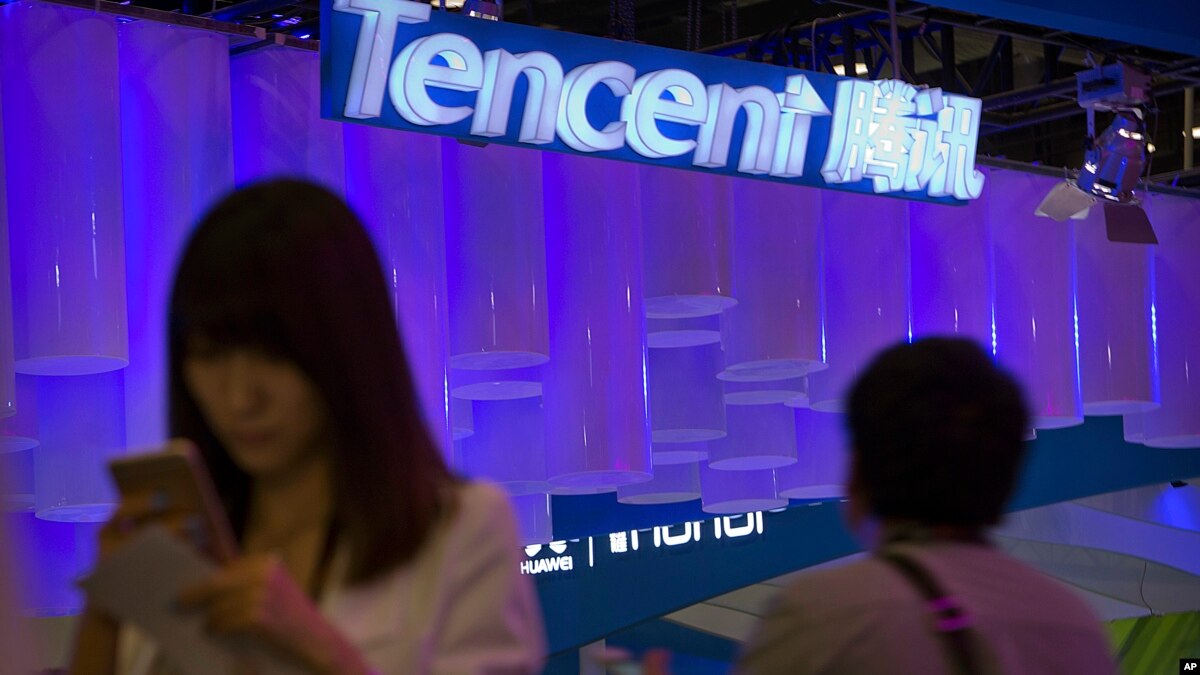
Major stock slides for Chinese tech firms in recent weeks have raised questions about their ability to face an uncertain future if Washington makes good on its threats to cut off the flow of new technology to China.
The worst hit is Tencent, the world’s eighth biggest company by stock value, which recently lost $45 billion in a major stock market slide. Several other Chinese technology companies have also suffered in the market.
The Trump administration has said it is trying to block the rampant theft of American technology in China, but others see it as an attempt to hurt the Made in China 2025 technology development plan.
The Trump administration initially began imposing punitive duties on Chinese goods in an attempt to reduce the huge U.S. trade deficit with China. But the efforts have not yet yielded the expected results in terms of deficit reduction according to Lourdes Casanova, Director of Emerging Markets Institute at Cornell University's SC Johnson School of Management
“The total trade deficit till June was already $185 billion,” Casanova told VOA while discussing the trade figures between January and the end of June. “The trend of trade deficit was maintained in 2018. We will have a trade deficit as big as last year. …In spite of all these measures, the numbers are the same.”
The year 2017 had ended with a trade deficit of $375 billion for the U.S..
As part of its trade spat with China, the U.S. government is also now scrutinizing the flow of technology to China. Past administrations in the U.S. had concerned themselves with dual use technologies, which are those that have both civilian and military value. But the Trump administration wants to curb the outflow of all kinds of American technologies to China because of its ability to quickly adapt them and compete with U.S. companies, which have a higher-cost production cycle.
Market slide
While Tencent’s stock slide was not triggered directly by any U.S. action, it exposed the rising vulnerabilities of Chinese technology firms. Tencent suffered largely because of action or non-action of Chinese censors, which determines what kind of games are suitable for release to the youth and children.
“The biggest reason is that the Chinese government hasn't given them the go ahead for the games. This is part of a much broader moratorium on gaming (licenses for new games haven't been approved since March) as well as increased scrutiny on online content from government watchdogs,” according to John Artman, editor-in-chief of a web based technology magazine, Technode.
Technology is a key aspect of China’s relationship with not just the U.S. but all developed countries. China’s competitive strength in manufacturing is largely driven by low wage cost. But new technologies like Artificial Intelligence, robotics, 3D printing and the “internet of things,” are replacing the need for labor-intensive manufacturing and helping the developed countries to change the market dynamics. Besides, Chinese planners realize the country is still heavily dependent on imported technologies and the Trump administration’s campaign is bound to hit Beijing’s 2025 plan for technological growth.
“The issues of technology transfers, intellectual property theft, and China’s industrial upgrading strategy, Made in China 2025, are not going to go away. On the contrary, the U.S. is likely to pump up the pressure even further and may step up efforts to work with European countries to try to isolate China in these areas,” said an editorial in Caixing, China’s prominent business magazine.
Wang Chen, a partner with Xufunds Investment Management in Shanghai told the South China Morning Post, “The trouble is brewing in the sector and the problems facing the companies are that either they hit a bottleneck in growth or the competition is getting fiercer. After a decent run-up in share prices last year, their valuations have expanded too quickly and they are now being fixed.”
Semi-conductor challenge
The U.S. gave a taste of what it can do when the Trump administration cut off access to the American market to Chinese telecommunications equipment maker, ZTE, accusing it of using stolen technology. Though the decision was later relaxed, Washington sent out a clear signal to explain the impact of a possible trade war on China’s technology related business.
Beijing’s main fear is that its supply of crucial semi-conductors and semi-conductor technology supplied by Intel and Qualcomm may be hampered. “China still buys a lot of semi conductors from U.S.,” Casanova said, while explaining that, “China is investing a lot of money to make its own semi conductors and be less dependent on Intel.”
“After the ZTE fiasco, the government has an even better reason to push for domestic innovation. China has always pushed for as much independence from the rest of the world as possible and ZTE was a wake up call that they're still dependent for basic technological goods,” Artman said.
Experts said both technology and non-technology companies in the U.S., including giants like Apple, Microsoft and Wal-Mart, are likely to suffer a severe setbacks if an exasperated China chooses to give a call for boycotting American technology goods. Casanova pointed out that the South Korean cosmetic industry was badly hit by a boycott call that came after military differences between China and its neighbor last year.
“We could see that (happening) when China says ‘we are also going to boycott U.S. products in China,’” she said. “You have not only technology companies like Apple, or Microsoft, then we go down to Walmart.. we go to MacDolands, Qualcomm….for many companies a big chunk of the revenue and profit is coming from China.”
Read More Technology Woes Add to China’s Fear of Trade War with US : https://ift.tt/2nUXFJf
No comments:
Post a Comment